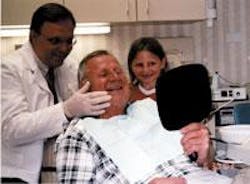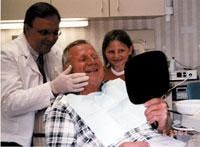The time factor in preventing a dental disaster!
Arvid Saunaitis, CDT and Ron Schefdore, DMD
Establishing a dental practice that focuses on quantity at the expense of quality can end up becoming a bad business decision.The discounted lab work and office procedures do not allow for attention to detail, which, in turn, can lead to higher failure rates for restorations. For example, porcelain can fracture, open margins can develop leakage, leading to decay forming underneath crowns; and ill-fitting full and partial dentures can cause TMD or other medical problems.
This type of discounted dentistry also requires good communication skills in order to convince the patient that the less expensive appliance with obvious shortcomings is the best that can be done. If a dentist cannot provide the HMO or PPO patient with the proper treatment due to low reimbursement rates, then the dentist should not participate. In addition, inexpensive lab work is not only bad for patients, but also hurts quality dental laboratories.
Quality full and partial denture laboratories cannot survive and are closing in record numbers, according to John Winings, director of dental technology at Southern Illinois University, and Arvid Saunaitis, CDT, owner of my removable lab. Understanding the effect that the disappearance of talented laboratory craftsmen will have on our profession is reason for great concern. I am not looking forward to the countless adjustments, remakes, and looks that patients give when something is not right. Let's solve the problem by explaining to our patients the difference a quality lab can make. The higher fee to cover the cost of utilizing a quality lab benefits everyone, including patients. The dentist's job is to provide happy and lasting smiles.
During the last few decades, the dental industry has made great strides in helping dentists enhance the appearance of their patients. With the use of high-tech computers and extensive training programs, dental manufacturers have transcended beyond crown and bridge and implants into a new era of dental technology. For patients who are no longer candidates for implants or crown and bridge restorations because of bone loss — or for those who cannot afford the cost of these procedures — removable partials are an alternative.
Implant-retained removable appliances also require custom casting, crafted by partial denture technicians. According to a study published by the Harvard University Dental School in the Journal of Prosthodontic Dentistry, the need for full and partial dentures will increase. Unfortunately, technicians who make partial frameworks, on average, make less money than drivers who deliver the cases from the lab to dentists' offices. After completing a two-year college dental technology program, most graduates start work earning less than $10 per hour in a profession that continues to be hidden from the public. This has caused enrollment in dental technology schools to drop so dramatically that most colleges have closed their dental technology curriculums entirely.
Dental manufacturers are competing to improve the technology in crown and bridge and are not paying attention to an industry that is facing extinction. If technicians continue to leave the industry at the same rate and are not replaced, it will affect the medical industry as well. After all, teeth are an integral part of the digestive system.
For the past 20 years, I have worked hard to prevent this quickly approaching disaster by publishing suggestions, contacting dental and government organizations, and asking private corporations for assistance. Unfortunately, I have failed. I strongly believe that if something is not done soon, the damage will be irreversible and an aging population and future generations will suffer.
Arvid Saunaitis, CDT, is the president of Kromex Dental Laboratory and presenter of Forum for Prosthetic Dentistry Seminars. Contact him at (773) 436-9440 or email him at [email protected]. Ronald L. Schefdore, DMD, is a speaker, consultant, writer, and mentor in the dental field. He has practiced general dentistry for over 20 years. Contact him at (630) 986-1780 or email him at [email protected] for information.

